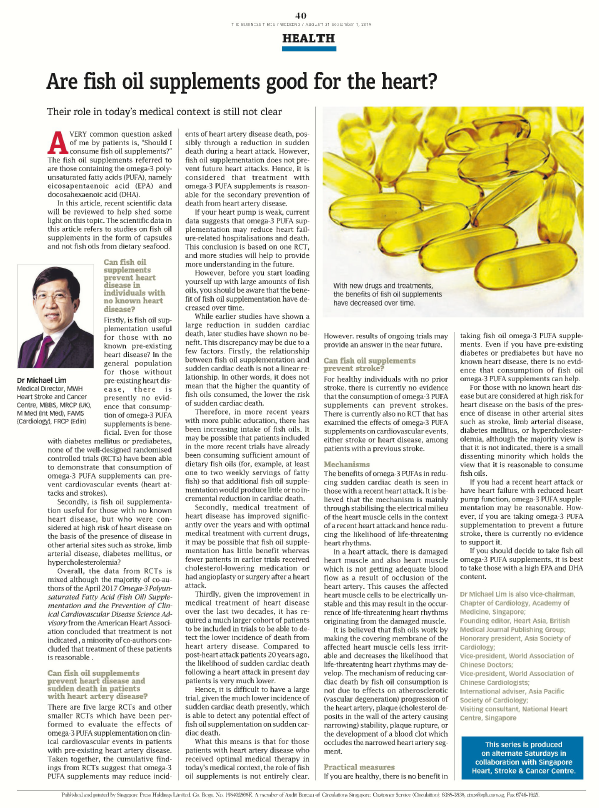Are fish oil supplements good for the heart?
Their role in today’s medical context is still not clear
A very common question asked of me by patients is, “Should I consume fish oil supplements?” The fish oil supplements referred to are those containing the omega-3 poly unsaturated fatty acids (PUFA), namely eicosapentaenoic acid (EPA) and docosahexaenoic acid (DHA).
In this article, recent scientific data will be reviewed to help shed some light on this topic. The scientific data in this article refers to studies on fish oil supplements in the form of capsules and not fish oils from dietary seafood. Firstly, is fish oil supplementation useful for those with no pre-existing heart disease? In the general population for those without pre-existing heart disease, there is presently no evidence that consumption of omega-3 PUFA supplements is beneficial. Even for those with diabetes mellitus or prediabetes, none of the well-designed randomized controlled trials (RCTs) have been able to demonstrate that consumption of omega-3 PUFA supplements can prevent cardiovascular events (heart attacks and strokes).
Secondly, is fish oil supplementation useful for those with no known heart disease, but who were considered at high risk of heart disease on the basis of the presence of disease in other arterial sites such as stroke, limb arterial disease, diabetes mellitus, or hypercholesterolemia?
Overall, the data from RCTs is mixed although the majority of co-authors of the April Omega-3 Polyunsaturated Fatty Acid (Fish Oil) Supplementation and the Prevention of Clinical Cardiovascular Disease Science Advisory from the American Heart Association concluded that treatment is not indicated, a minority of co-authors concluded that treatment of these patients is reasonable.
Can fish oil supplements prevent heart disease and sudden death in patients with heart artery disease?
There are five large RCTs and other smaller RCTs which have been performed to evaluate the effects of omega-3 PUFA supplementation on clinical cardiovascular events in patients with pre-existing heart artery disease. Taken together, the cumulative findings from RCTs suggest that omega-3 PUFA supplements may reduce incidents of heart artery disease death, possibly through a reduction in sudden death during a heart attack. However, fish oil supplementation does not prevent future heart attacks. Hence, it is considered that treatment with omega-3 PUFA supplements is reasonable for secondary prevention of death from heart artery disease.
If your heart pump is weak, current data suggests that omega-3 PUFA supplementation may reduce heart failure-related hospitalizations and death. This conclusion is based on one RCT, and more studies will help to provide more understanding in the future.
However, before you start loading yourself up with large amounts of fish oils, you should be aware that the benefit of fish oil supplementation have decreased over time.
While earlier studies have shown a large reduction in sudden cardiac death, later studies have shown no benefit. This discrepancy may be due to a few factors. Firstly, the relationship between fish oil supplementation and sudden cardiac death is not a linear relationship. In other words, it does not mean that the higher the quantity of fish oils consumed, the lower the risk of sudden cardiac death.
Therefore, in more recent years with more public educations, there has been increasing intake of fish oils. It may be possible that patients included in the more recent trials have already been consuming sufficient amount of dietary fish oils (for, example, at least one to two weekly servings of fatty fish) so that additional fish oil supplementation would produce little or no incremental reduction in cardiac death.
Secondly, medical treatment of heart disease has improved significantly over the years and with optimal medical treatment with current drugs, it may be possible that fish oil supplementation has little benefit whereas fewer patients in earlier trials received cholesterol-lowering medication or had angioplasty or surgery after a heart attack.
Thirdly, given the improvement in medical treatment of heart disease over the last two decades, it has required a much larger cohort of patients to be included in trials to be able to detect the lower incidence of death from heart artery disease. Compared to post-heart attack patients 20 years ago, the likelihood of sudden cardiac death following a heart attack in present day patients is very much lower.
Hence, it is difficult to have a large trial, given the much lower incidence of sudden cardiac death presently, which is able to detect any potential effect of fish oil supplementation on sudden cardiac death.
What this means is that for those patients with heart artery disease who received optimal medical therapy in today’s medical context, the role of fish oil supplements is not entirely clear. However, results of ongoing trials may provide an answer in the near future.
Can fish oil supplements prevent stroke?
For healthy individuals with no prior stroke, there is currently no evidence that the consumption of omega-3 PUFA supplements can prevent strokes. There is currently also no RCT that has examined the effects of omega-3 PUFA supplements on cardiovascular events, either stroke or heart disease, among patients with a previous stroke.
Mechanisms
The benefits of omega-3 PUFAs in reducing sudden cardiac death is seen in those with a recent heart attack. It is believed that the mechanism is mainly through stabilizing the electrical milieu of the heart muscle cells in the context of a recent heart attack and hence reducing the likelihood of life-threatening heart rhythms.
In a heart attack, there is damaged heart muscle and also heart muscle which is not getting adequate blood flow as a result of occlusion of the heart artery. This causes the affected heart muscle cells to be electrically unstable and this may result in the occurrence of life-threatening heart rhythms originating from the damaged muscle.
It is believed that fish oils work by making the covering membrane of the affected heart muscle cells less irritable and decreases the likelihood that life-threatening heart rhythms may develop. The mechanism of reducing cardiac death by fish oil consumption is not due to effects on atherosclerotic (vascular degeneration) progression of the heart artery, plaque (cholesterol deposits in the wall of the artery causing narrowing) stability, plaque rupture, or the development of a blood clot which occludes the narrowed heart artery segment.
Practical measures
If you are healthy, there is no benefit in fish oil omega-3 PUFA supplements. Even if you have pre-existing diabetes or prediabetes but have no known heart disease, there is no evidence that consumption of fish oil omega-3 PUFA supplements can help.
For those with no known heart disease but are considered at high risk for heart disease on the basis of the presence of disease in other arterial sites such as stroke, limb arterial disease, diabetes mellitus, or hypercholesterolemia, although the majority view is that it is not indicated, there is a small dissenting minority which holds the view that it is reasonable to consume fish oils.
If you had a recent heart attack or have heart failure with reduced heart pump function, omega-3 PUFA supplementation may be reasonable. However, if you are taking omega-3 PUFA supplementation to prevent a future stroke, there is currently no evidence to support it.
If you should decide to take fish oil omega-3 PUFA supplements, it is best to take those with high EPA and DHA content.
Business Times
31 August 2019

